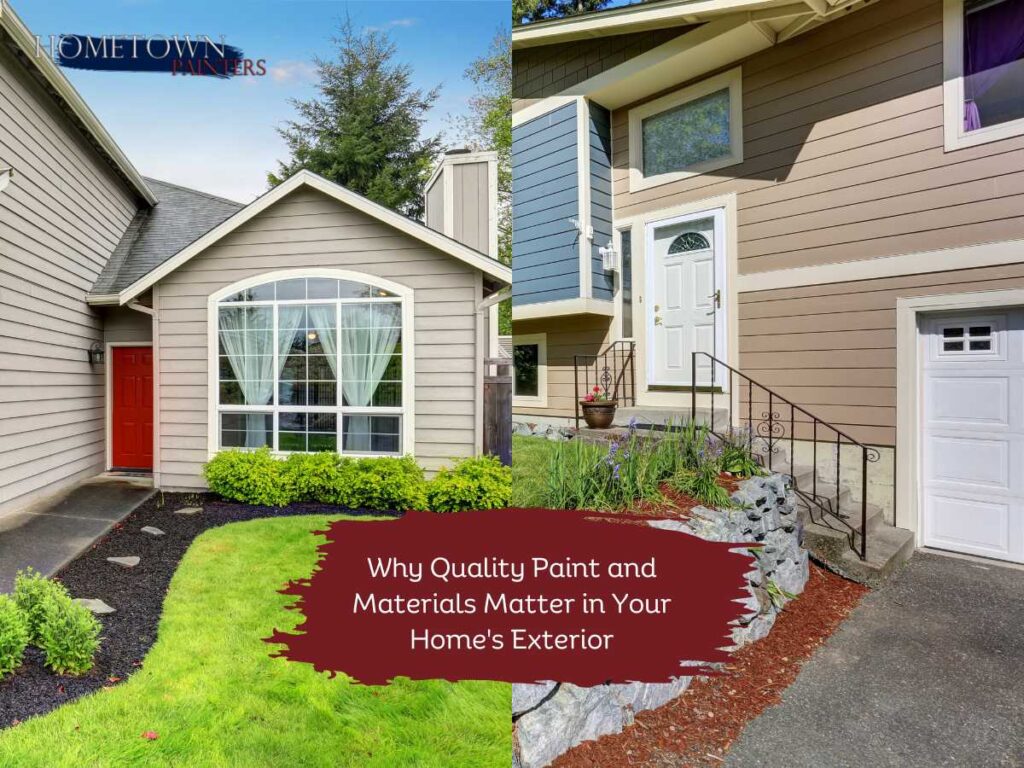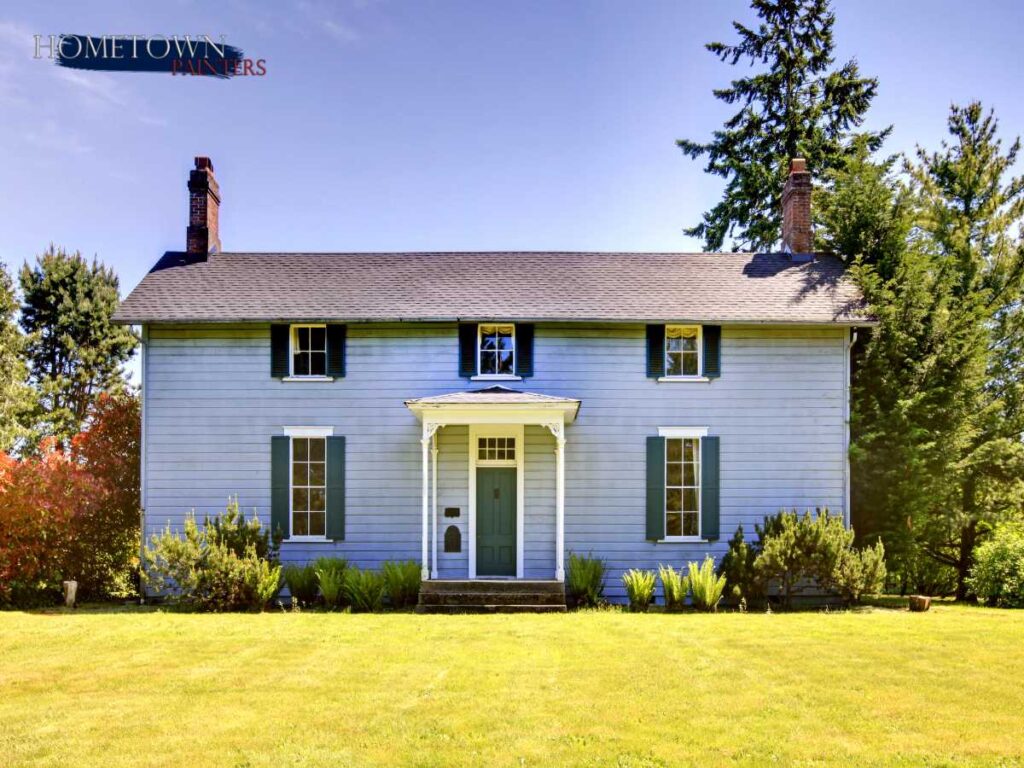When it comes to maintaining and upgrading your home’s exterior, choosing the right paint and materials is critical. The exterior of your home is the first thing people see, and it’s important to make a good first impression. Not only does the right paint and materials enhance your home’s curb appeal, but they also protect it from damage caused by weather, UV rays, and other environmental factors. In this blog post, we will explore why quality paint and materials matter for your home’s exterior and why it’s worth investing in them. We will cover the benefits of using high-quality materials, the role of primer, common problems caused by poor-quality exterior paint, tips for choosing the best quality materials, and how to maintain a high-quality exterior paint job over time. So, let’s dive in!

The Importance of Choosing Quality Paint for Your Home's Exterior
Choosing the right paint is crucial for protecting your home’s exterior from damage and maintaining its appearance. High-quality paint contains better ingredients, such as resins and pigments, which create a thicker, more durable layer of protection against harsh elements like rain, sun, wind, and snow. Quality paint also retains its color and finish for longer periods, meaning you won’t need to repaint as frequently, saving you time and money in the long run. When selecting paint, look for reputable brands that offer warranties and have a reputation for quality. Also, consider the climate of your area, as certain paints may perform better in specific conditions. Overall, investing in quality paint will pay off in the long run, keeping your home looking beautiful and protected for years to come.
How Quality Paint Protects Your Home's Exterior from Damage
Quality paint not only enhances the appearance of your home’s exterior but also serves as a protective barrier against environmental damage. Exposure to harsh elements like rain, snow, and UV rays can cause structural damage and wear and tear to your home. Quality paint is designed to resist these elements, preventing water from seeping into the walls and rotting the wood or corroding the metal. The right paint can also reflect UV rays, reducing heat absorption and minimizing fading, peeling, or cracking. Additionally, quality paint contains a higher percentage of pigments, which improve adhesion and prevent chalking or flaking over time. By investing in quality paint, you can extend the life of your home’s exterior and avoid costly repairs in the future.
Understanding the Benefits of Using High-Quality Materials for Your Home's Exterior
- Provides better insulation, reducing energy costs and keeping your home comfortable year-round.
- Offers greater design flexibility, allowing you to choose from a variety of colors, textures, and styles to complement your home’s architecture.
- Resistant to rot, mold, and insect damage, ensuring your home’s structural integrity remains intact.
- Requires minimal maintenance and lasts for years, providing long-term value and saving you money.
- Enhances your home’s value, curb appeal, and overall aesthetic appeal.
The Relationship Between Material Quality and Long-Term Durability
The quality of materials used in your home’s exterior plays a significant role in its long-term durability. High-quality materials like fiber cement, vinyl, or wood siding are designed to withstand the elements and last for decades, while cheaper materials like low-grade wood or vinyl can deteriorate quickly, requiring frequent repairs or replacements. Investing in quality materials upfront may be more expensive, but it pays off in the long run by providing greater durability, longevity, and protection for your home. Quality materials are also less prone to cracking, fading, warping, or chipping, ensuring your home’s exterior looks great for years to come. In addition, choosing quality materials increases the resale value of your home, making it a smart investment in both the short and long term.

The Role of Primer in Achieving a High-Quality Exterior Paint Job
Primer plays a crucial role in achieving a high-quality exterior paint job. It serves as a preparatory layer between the surface and the topcoat, helping to create a smooth, uniform surface for the paint to adhere to. Primer also helps to seal porous surfaces, preventing moisture from seeping in and causing damage. Additionally, primer provides added protection against UV rays, reducing the risk of fading and discoloration over time. Using primer also extends the life of your paint job by ensuring that the paint adheres properly and lasts longer. It also saves you money in the long run by reducing the need for frequent touch-ups and repaints. When selecting primer, make sure to choose a high-quality product that is compatible with both the surface and the paint you plan to use.
Quality vs. Cost: Why Investing in Good Materials is Worth It
When it comes to home improvement projects, quality materials often come with a higher price tag than cheaper alternatives. However, investing in good materials is worth it in the long run. Quality materials like fiber cement, vinyl, or wood siding, provide superior durability, longevity, and protection against the elements. Cheaper materials, on the other hand, may be more prone to wear and tear, requiring frequent repairs or replacements that can add up in costs over time. Investing in quality materials also enhances your home’s value, curb appeal, and overall aesthetic appeal, making it a smart investment that pays off when it comes time to sell. Additionally, high-quality materials often come with longer warranties, providing added peace of mind knowing that you’re covered in case anything goes wrong. By weighing the benefits of quality materials against their higher upfront cost, it becomes clear that investing in good materials is a wise choice that provides long-term value and satisfaction.
Common Problems That Arise from Using Poor-Quality Exterior Paint and Materials
Using poor-quality exterior paint and materials can lead to several problems that can impact the longevity and appearance of your home. For example, low-quality paint may fade, crack, or peel more quickly than higher-quality paint, resulting in a shabby-looking exterior that requires frequent touch-ups or repainting. Low-quality materials may also be more prone to damage from moisture, pests, or the sun’s UV rays, resulting in costly repairs or replacements down the line. In addition, low-quality materials may not be as energy-efficient as higher-quality materials, leading to higher energy bills and less comfort inside the home. Choosing quality materials may require a larger upfront investment, but it saves you money in the long run by avoiding costly repairs and replacements and ensuring your home looks great for years to come. Keywords: poor-quality, exterior paint, materials, fading, cracking, peeling, moisture damage, energy efficiency.
The Environmental Impact of Using High-Quality Paints and Materials for Your Home's Exterior
Using high-quality paints and materials for your home’s exterior can have a positive impact on the environment. For example, many high-quality paints are formulated with low levels of volatile organic compounds (VOCs), which are harmful to human health and contribute to air pollution. By choosing low-VOC or no-VOC paints, you can improve indoor air quality and reduce your carbon footprint. Additionally, high-quality materials like fiber cement or wood siding are often made from sustainable or recycled materials, reducing the amount of waste produced and conserving natural resources. Using energy-efficient materials like insulated siding or energy-efficient windows can also help reduce your home’s energy consumption, leading to lower carbon emissions and a smaller environmental footprint. By choosing high-quality, environmentally-friendly materials, you can make a positive impact on the planet while also improving your home’s durability, aesthetics, and overall value. Keywords: environmental impact, high-quality paints, low-VOC, sustainability, energy efficiency, carbon footprint.
Tips for Choosing the Best Quality Paint and Materials for Your Home's Exterior
Do your research
Research different types of paints and materials to determine which ones are the best fit for your home's style, climate, and budget.
Check the labels
Look for labels that indicate the product's durability, weather resistance, and environmental impact.
Choose quality over cost
Investing in high-quality paints and materials may require a larger upfront investment, but it will save you money in the long run by avoiding costly repairs and replacements.
Consider the warranty
Look for products that offer a warranty or guarantee, ensuring that you are covered in case anything goes wrong.
Hire a professional
Consider hiring a professional contractor who has experience working with high-quality paints and materials and can provide guidance on selecting the best products for your home's needs.
Get samples
Ask for samples or swatches of the paint and materials you are considering to see how they look and feel in person.
Read reviews
Look for reviews and testimonials from other homeowners who have used the products you are considering to get a sense of their quality and performance.
By following these tips, you can choose the best quality paints and materials for your home’s exterior, ensuring that it looks great and lasts for years to come. Keywords: choosing, best quality, paint, materials, research, labels, warranty, professional, samples, reviews.
How to Maintain a High-Quality Exterior Paint Job Over Time.
Maintaining a high-quality exterior paint job requires some effort, but it’s worth it to keep your home looking great and protected from the elements. Here are some tips for maintaining your exterior paint job over time:
- Clean regularly: Dirt and debris can accumulate on your home’s exterior over time, leading to a dull or faded appearance. Regular cleaning with a mild detergent and a soft-bristled brush can help keep your home looking its best.
- Repair damage promptly: If you notice any cracks, chips, or peeling in your paint, it’s important to address them promptly to prevent further damage. Sand down the affected area, apply primer and touch up with paint.
- Check for moisture damage: Water damage can quickly ruin a paint job and lead to mold or mildew growth. Check for any signs of moisture damage, such as peeling paint, and repair them promptly.
- Trim vegetation: Overhanging trees or shrubs can scratch or damage your home’s paint job. Keep vegetation trimmed back to prevent damage.
- Repaint as needed: Even the best-quality paint job will eventually fade or wear down over time. Plan to repaint your home every 5-10 years or as needed to keep it looking fresh and protected.
Conclusion:
In conclusion, choosing high-quality paint and materials for your home’s exterior is an investment in both the appearance and longevity of your property. At Hometown Painters, we understand the importance of quality when it comes to painting and offer a range of residential and commercial painting contractor services in Elk Grove Village, IL. Our team of experienced professionals is dedicated to providing top-notch service for all of your painting needs, including commercial exterior and interior painting, new construction painting, townhome painting, HOA painting, residential exterior and interior painting, and more. Contact us today to learn more about our services and how we can help you achieve a beautiful, long-lasting paint job for your property.
